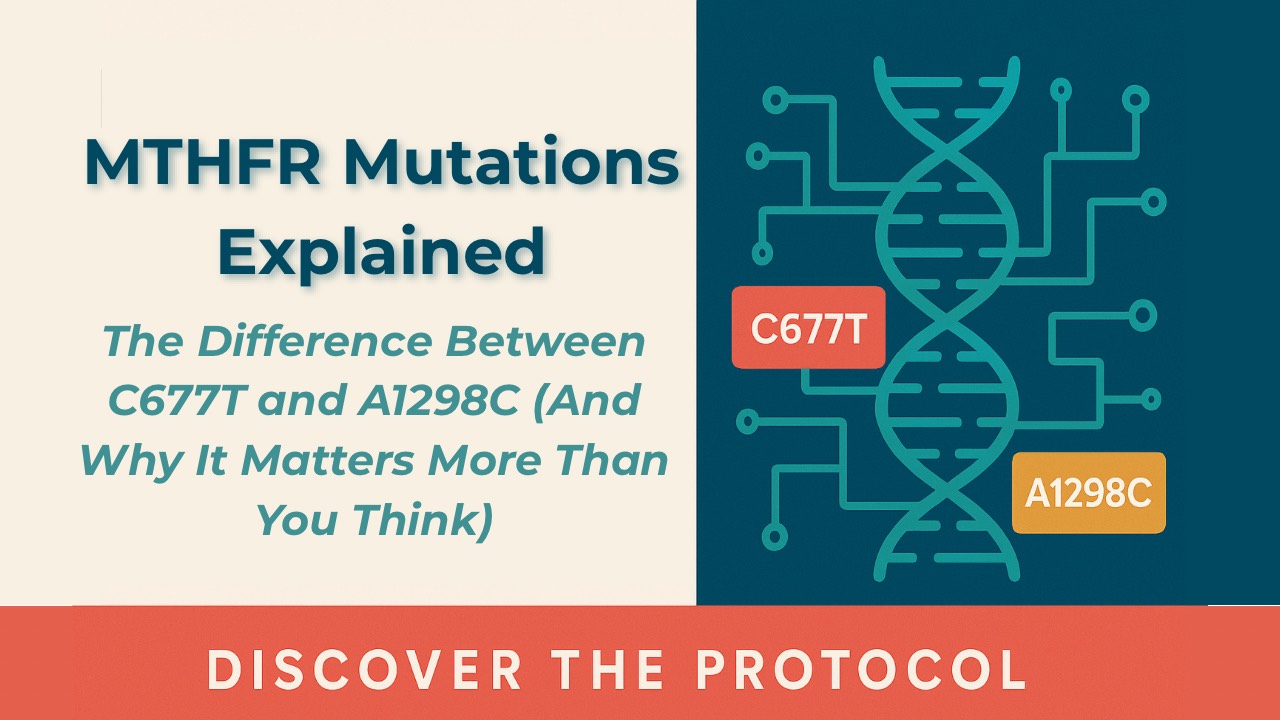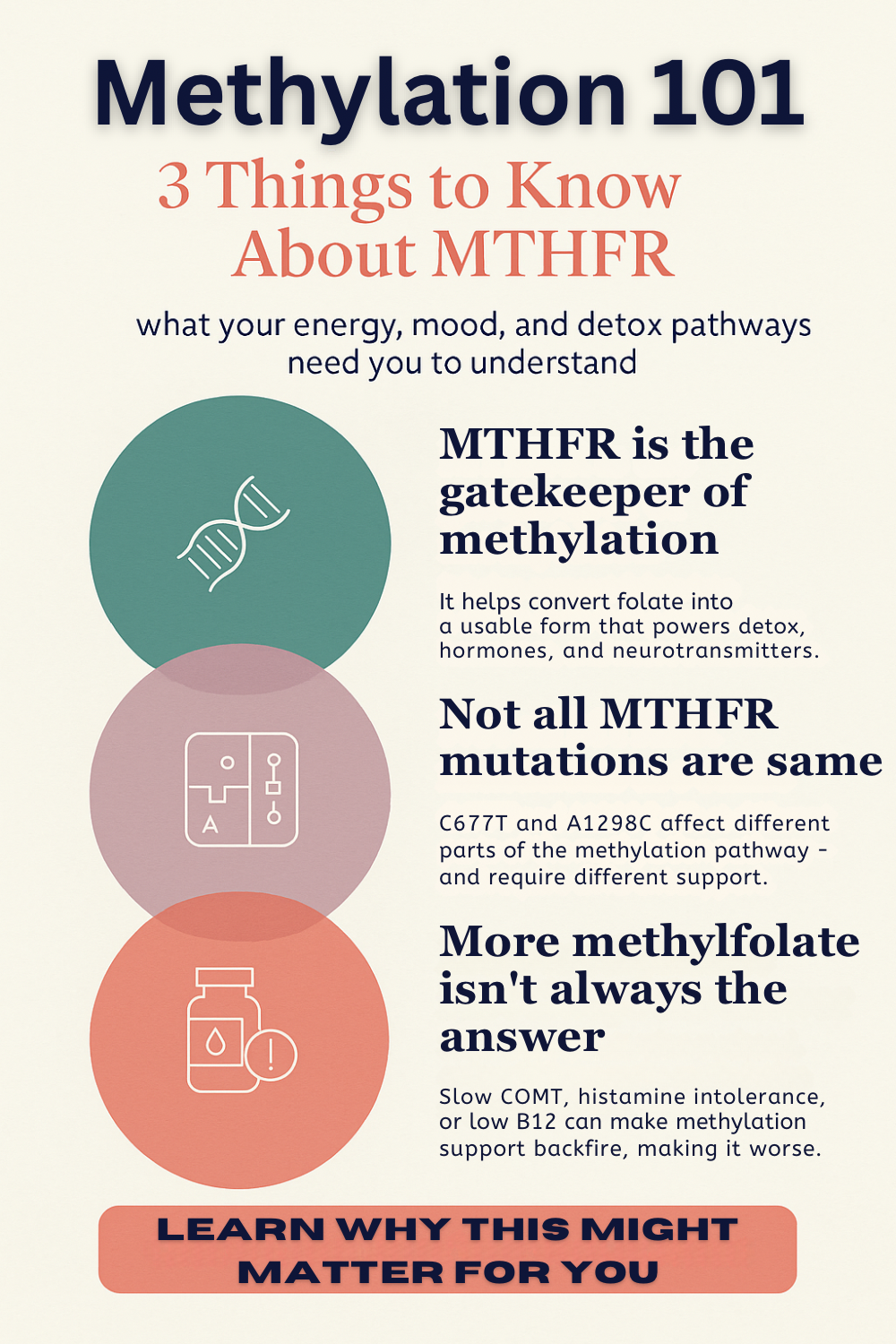MTHFR Mutations Explained: The Difference Between C677T and A1298C (And Why It Matters More Than You Think)

So you found out you have an MTHFR mutation.
Maybe it came up in a functional medicine visit, or you saw it buried in your genetic results and thought… okay, what does that mean? Am I supposed to do something about it? Or is it just another one of those odd acronyms that gets tossed around but never really explained?
And more specifically, does it matter which version you have?
Short answer?
It does.
But probably not in the way you’d expect.
Let’s slow this down and make it feel a bit more real. Not textbook. Not overwhelming. Just a grounded look at what this gene does, what the two main variants mean, and how to begin figuring out what (if anything) to do next.
Understanding Your MTHFR Mutation: What Does It Mean for Your Health?
Deciphering Your Genetic Report: Next Steps After Identifying MTHFR Variants
It’s easy to get stuck in a loop once you see something like C677T or A1298C on a report. Especially if no one walks you through what it means. There’s this moment where you’re trying to remember high school biology, thinking something like: Wait, wasn’t folate good?
Here’s the thing: a lot of people carry one (or both) of these gene variants. That part isn’t unusual. What matters more is how your body actually responds to it.
Because the way this gene functions, or struggles to, can touch more systems than you’d think. We’re talking about mood, energy, inflammation, detox, hormones… things you may have chalked up to just getting older, or stress, or not sleeping well. But sometimes, it starts here.
The Role of MTHFR in Folate Metabolism and Methylation
At the simplest level, the MTHFR gene helps turn folate (from food or supplements) into its active form, methylfolate. That’s the version your body actually uses.
MTHFR’s Function in Activating Folate
And methylfolate is part of something much bigger: methylation.
That word gets tossed around a lot, but the truth is, it’s foundational. Methylation is involved in hundreds of processes. Making neurotransmitters. Processing toxins. Managing inflammation. Even turning genes on or off.
The Significance of Methylation in Overall Health
A lot of practitioners compare methylation to an engine or a power grid. I think of it more like a central circuit board, if something’s off here, the lights flicker elsewhere. You might feel it as brain fog. Or mood swings. Or a nervous system that never quite settles.
Exploring the C677T Variant: Impacts on Energy and Detoxification
Let’s start with the C677T variant.
How C677T Affects Folate Conversion Efficiency
This one tends to affect how efficiently your body converts folate into methylfolate. If you carry one copy, it’s a bit slower. If you carry two, that conversion might be reduced by up to 60 to 70%.
You may not feel it all the time. But under stress, or when your body needs more support, the cracks start to show. You might get tired more easily. Your homocysteine levels could creep up. Recovery from workouts, or even just life, can feel slower than it should.
Recognizing Symptoms Associated with the C677T Mutation
People with C677T often mention feeling sluggish. Not always in a sleepy way, but in a kind of cellular heaviness. You’re doing everything right, but energy still lags. Detox can be slower, too. Chemical sensitivities, inflammatory symptoms, hormone imbalances, these all show up more often with this variant.
And if you’ve been taking folic acid (the synthetic kind)? You know, the one that’s in most big name brand multivitamins or B-complexes? That can make things even trickier. This variant doesn’t respond well to it, and sometimes it can even block what little methylfolate your body is making.
MTHFR A1298C Variant: Effects on Mood and Neurotransmitters
Now, A1298C works a little differently.
A1298C’s Influence on Neurotransmitter Production
It doesn’t usually affect folate conversion the same way C677T does. Instead, it influences a separate, but equally important pathway. Specifically, it affects something called BH4, which helps your body make neurotransmitters like dopamine, serotonin, and nitric oxide.
So while C677T shows up in metabolic ways, A1298C shows up more in the mood and nervous system.
Identifying Mood and Sleep Disturbances Linked to A1298C
You might notice anxiety, especially that buzzing, can’t-settle kind. Or difficulty sleeping, even when you’re exhausted. Histamine reactions, irritability, emotional swings. These patterns aren’t always easy to pin down, but they’re real. And they often trace back here.
One more thing: people with A1298C tend to be more sensitive to methylated supplements. You might try a B-complex and feel anxious or overstimulated within a few days. It’s not uncommon. It doesn’t mean you can’t support methylation, it just means you’ll need a gentler approach.
Compound Heterozygosity: Navigating the Challenges of Having Both C677T and A1298C
If you have one C677T and one A1298C, that’s called compound heterozygous. It’s surprisingly common and uniquely frustrating for some people.
Understanding the Combined Effects of C677T and A1298C
Because on one hand, you may have reduced folate conversion. On the other, you’ve got a sensitive nervous system that doesn’t tolerate support well. It’s like having low energy and too much stimulation at the same time.
I’ve seen people with this combo feel like they’re constantly ping-ponging between fatigue and anxiety. Supplements either don’t do enough, or they do too much. It’s easy to feel like nothing quite fits.
Strategies for Managing Dual MTHFR Variants
But here’s where it helps to zoom out and start gently. Your path might not be linear, but it is navigable once you understand what each side needs.
Comparing C677T and A1298C: Which Variant Has a Greater Impact?
It’s easy to fall into the trap of comparison, wondering whether C677T or A1298C is more serious. But that misses the point.
The real question isn’t “Which is worse?” It’s “What’s the pattern here?”
Assessing the Health Implications of Each MTHFR Variant
Each variant affects different systems. C677T leans more into detox and inflammation. A1298C touches neurotransmitters and sensitivity. Both matter. Neither is inherently bad.
It’s just that your body might need support in a slightly different way depending on what it’s working with.

Tailoring Methylation Support Based on Your MTHFR Variant
Let’s make this simple. Here’s a basic starting plan and what I have found well in practice:
Supplement Recommendations for C677T Carriers
- Methylfolate (start low and adjust slowly)
- B12 (methylcobalamin or hydroxy/adeno forms)
- Magnesium glycinate or magnesium threonate (often overlooked, always essential)
- Choline, specifically phosphatidylcholine, and creatine (they help conserve methyl groups)
Approaches for Supporting A1298C Variants
- Folinic acid (gentler than methylfolate)
- B6 in P5P form (supports neurotransmitter function)
- Nervous system support (magnesium glycinate, taurine, glycine)
- DAO support if histamine is part of the picture
Guidelines for Individuals with Both C677T and A1298C
- Go slow. Really slow.
- Consider starting with folinic acid before layering in low-dose methylfolate
- Focus on one system at a time, don’t rush detox and neurotransmitter support together
Deciding When to Test and How to Approach Supplementation
There’s no prize for doing it all at once.
Evaluating the Need for Genetic Testing
Sometimes the most helpful thing is stepping back and asking: how do I actually feel right now? Am I calm and focused? Or restless and foggy? Did a new supplement make things better or just louder?
Testing can offer insight, especially if you’ve done a panel like MaxGen’s The Works. But so can observation. You know your body better than anyone else.
Interpreting Supplement Reactions and Adjusting Accordingly
And if a new supplement made things worse, it might not be the wrong supplement. It might just be the wrong timing.
Viewing Methylation as a Dynamic Health Pattern
This isn’t about fixing or correcting something. It’s more about learning the language of your own system.
Embracing a Personalized Approach to Methylation Support
Sometimes it takes a while to figure out. You test a little. Try a few things. Pull back. Notice a pattern. Try again.
There’s space for that here.
If you’re looking for somewhere to start, this is the test I use in my practice. It’s not the only good panel out there, but it’s the one that, time and again, has helped my patients and clients make actual progress.
Not because it promises everything. But because it gives you a starting point that finally makes sense.
Or, if aren’t ready to take a genetic test, look at some of our protocols. We have a great one that’s free, called our nervous system reset. So if your nervous system feels like it’s holding on too tightly, you can explore the Nervous System Reset Protocol we put together.
No pressure. No finish line. Just a chance to tune in with a bit more clarity.

